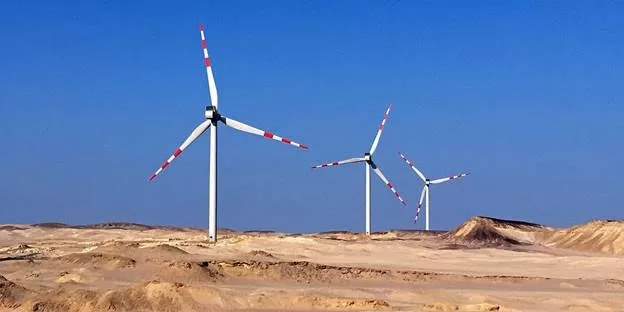Egypt’s Prime Minister Moustafa Madbouli attended on Tuesday the inauguration of a 252 MW wind power plant in the Gulf of Suez.
The inaugural ceremony was also attended by Minister of Electricity and Renewable Energy Mohamed Shaker, alongside Amb. Christian Berger, Head of the Delegation of the European Union to Egypt, Frank Hartmann, Ambassador of Germany to Egypt, Eric Chevallier, Ambassador of France in Cairo and Mohamed El Khayat, Chairman of the New and Renewable Energy Authority.
The wind farm is a significant step towards clean and sustainable energy for Egypt and will enhance energy efficiency, ensure reliable electricity supply and reduce harmful emissions. It is also the result of European Development Partner’s and Egypt’s intensified co-operation in the clean energy sector.
The wind farm is funded by the German Federal Ministry for Economic Co-operation and Development (BMZ) through KfW Development Bank (KfW) as lead financing agency, the European Union, the European Investment Bank (EIB) and Agence Française de Développement (AfD).
The wind power plant features 70 wind turbines at the Gulf of Suez about 25 km south of Ras Gharib. Per year, approx. 1200 GWh of green electricity will be produced and can supply about 400,000 households with electrical energy. Thus, 500,000 tonnes of CO2 emissions are being saved year by year.
“Renewable energy is vital to achieving climate neutrality and energy security, and Egypt possesses key assets: sun and wind. The EU is the world’s biggest provider of climate finance, accounting for more than 40% of worldwide public climate funds through its Member States. In our partner countries, we use technical assistance, capacity building, investments and guarantees to mitigate risks and leverage private participation. With the appropriate investment and legislation, renewable energy can become mainstream, opening up new markets, economies of scale and business opportunities,” said Ambassador Christian Berger, Head of the European Union Delegation to Egypt.
“The longstanding and fruitful co-operation between Egypt and Germany in the energy sector is bearing fruits. The Gulf of Suez Wind Power Plant is a prime example for how we jointly with partners take concrete measures towards Just Green Energy Transition. This benefits all of our countries as climate change is not stopping at national borders and brings Egypt one step closer to its target of 42% Renewable Energy by 2030,” said Ambassador Frank Hartmann.
The French ambassador, Eric Chevallier, highlighted Egypt’s remarkable energy journey, as it aspires to become a regional green hub in Africa, by rapidly transitioning and capitalising on its abundant wind and solar resources: “The inauguration of this pioneering renewable energy project marks a significant milestone in our longstanding partnership between Egypt and Europe. France remains strongly committed to playing an active role in enabling Egypt’s renewable ambitions and building up new and innovative value chains.”
Egypt’s electricity sector is undergoing a transformation towards low-carbon energy sources and updated its Nationally Determined Contribution (NDC) in June 2023. In future, Egypt plans to boast abundant natural resources, particularly in wind and solar energy. The country has a potential to generate up to 350 GW from wind power and 650 GW from solar photovoltaic systems. Over 40,000 square kilometres have been allocated for implementing renewable energy projects, with plans to host approximately 150 GW from solar farms and 120 GW from wind farms.
To incentivise investment in renewable energy projects, Egypt has introduced measures such as signing long-term power purchase agreements (PPAs) for 25 years and offering custom duty exemptions on imported materials and equipment for renewable energy installations. These initiatives aim to attract further domestic and international investments.






Discussion about this post